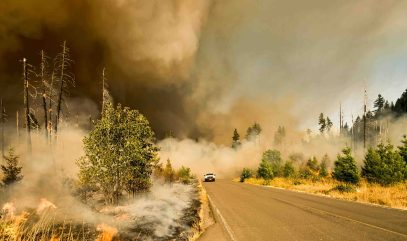Build a Better Business - Environment
The Environment is the fourth component of building a better business. While we have this as the fourth component, it is arguably the most important. Other components are exceedingly difficult to pursue without a healthy Environment supporting them.
The Environment is more than just the wilderness or the forest. The Environment is all of our surroundings – it is nature, the built environment in cities, rural areas and farms, lakes, rivers, oceans, and wildlife. It is everything that surrounds and sustains human beings.
We interact with our environment every day, through everything we do. And our actions have impacts. For example, managing sewage has been a problem since ancient times. Scientists believe that methane levels increased during the Roman empire due to increases in metallurgy and expansion of agriculture. During the Industrial Revolution, soot in Manchester, England, was so thick that it directly impacted the evolution of the peppered moth, allowing black-bodied moths to gain advantage over their light-colored cousins. More recently, we’ve had challenges with clean air across the US and the world. There are also large problems with water quality in many communities (Flint, Elk River, Parkersburg, Fayetteville, Hinkley, and Yakima) caused by industrial chemical leaks, chemicals from electric utilities, ash, and chemicals from coal mining, run-off from cattle farms, and other sources.
Our actions as businesses are important because we all live in one large, interconnected, circular system. An obvious example of a circular system is water. Rain in the mountains runs into streams, which run into rivers, which run into the ocean where water evaporates and eventually returns to the mountains in the form of rain. Pollution that enters this system at any point are eventually distributed across the entire system. Contaminants that enter the system in Spokane eventually make their way to Portland and the Pacific Ocean, and then return to Spokane via rainfall in the Selkirks, Cabinets, and other surrounding mountains that feed our aquifer.
Water is just one point in the larger, circular system that we call our environment. We all depend on the environment to live – the environment provides us with food, water, and air that is essential to daily life. Contaminants in our water, air, and land can end up in our food supply, be ingested through drinking water and other beverages, and impact our lungs when we breathe. Our relationship with our environment has a direct impact on our individual health, as well as the health of our communities.
Everyone in a circular system has a vested interest in maintaining the quality of that system. As businesses, some of the following actions can help mitigate the impact we have on the environment:
- monitor, record, and reduce greenhouse gas emissions
- use energy-efficient lighting systems, office equipment, and heating and air-conditioning systems
- use low-impact renewable energy
- purchase renewable energy credits to offset any nonrenewable energy that you use
- provide employees with incentives to use alternative commuting options to get to work
- conduct life cycle assessment of your products
The Environment is a key part of building a better business precisely because of the direct impact the Environment has on the lives of employees and our communities. Healthy environments mean people will be healthier, which translates to fewer sick days and improved productivity for employees. Healthy environments mean fewer childhood diseases, fewer school days missed, and stronger, more creative children who will grow up to be employees and customers. Healthy environments also provide opportunities to explore and connect with nature, something doctors are increasingly prescribing to patients in the US and other countries and is being proven to have positive impacts on many health conditions.
Currently, we are all part of an evolutionary experiment not too unlike that of the peppered moth. Only in our case, we have a choice in the matter because we have control over the levels of pollution. Business has a role to play – the question right now is what role it will be.
Overwhelmed? No worries, we’ve got this! For the Good.
Read More
Reject the business case for sustainability: The 1980s wants its business case back
They say a rising tide raises all boats. But there isn’t any raising to be done when the tide no longer comes into the bay – all boats remain stranded. We are often asked about the business case for sustainability. For y
Protect Your Community or Organization with a Climate Action Plan
Introduction Our changing climate impacts every aspect of our lives—our economy, our communities, and the environment—in ways both visible and unseen. While scientists and environmental organizations have long recognized
Witnessing the world of sustainable business firsthand
As a young student with a passion for climate justice and sustainability, it always felt like a contradiction to pursue a degree in business. From what I had witnessed, businesses didn’t necessarily operate ethically. Mu
Interning with Purpose: My Journey with Measure Meant
From January to May 2024, I had the distinct pleasure of working with Measure Meant as an Operations Intern. As a graduating senior at Gonzaga University, I had not planned on pursuing another internship in my final seme




